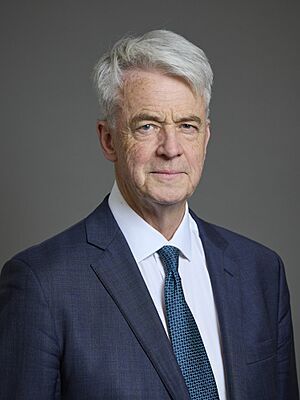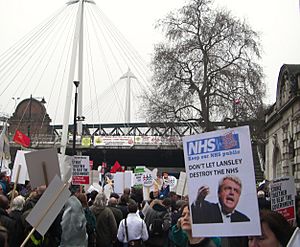Andrew Lansley facts for kids
Quick facts for kids
The Lord Lansley
CBE DL
|
|||||||||||||||||||||||||
|---|---|---|---|---|---|---|---|---|---|---|---|---|---|---|---|---|---|---|---|---|---|---|---|---|---|

Official portrait, 2025
|
|||||||||||||||||||||||||
| Leader of the House of Commons | |||||||||||||||||||||||||
| In office 4 September 2012 – 14 July 2014 |
|||||||||||||||||||||||||
| Prime Minister | David Cameron | ||||||||||||||||||||||||
| Preceded by | George Young | ||||||||||||||||||||||||
| Succeeded by | William Hague | ||||||||||||||||||||||||
| Lord Keeper of the Privy Seal | |||||||||||||||||||||||||
| In office 4 September 2012 – 14 July 2014 |
|||||||||||||||||||||||||
| Prime Minister | David Cameron | ||||||||||||||||||||||||
| Preceded by | George Young | ||||||||||||||||||||||||
| Succeeded by | The Baroness Stowell of Beeston | ||||||||||||||||||||||||
| Secretary of State for Health | |||||||||||||||||||||||||
| In office 12 May 2010 – 4 September 2012 |
|||||||||||||||||||||||||
| Prime Minister | David Cameron | ||||||||||||||||||||||||
| Preceded by | Andy Burnham | ||||||||||||||||||||||||
| Succeeded by | Jeremy Hunt | ||||||||||||||||||||||||
|
|||||||||||||||||||||||||
|
|||||||||||||||||||||||||
| Personal details | |||||||||||||||||||||||||
| Born | 11 December 1956 Hornchurch, England |
||||||||||||||||||||||||
| Political party | Conservative (since 1988) | ||||||||||||||||||||||||
| Other political affiliations |
SDP (until 1988) | ||||||||||||||||||||||||
| Spouses | Marilyn Biggs (Divorced) Sally Low |
||||||||||||||||||||||||
| Children | 5 | ||||||||||||||||||||||||
| Alma mater | University of Exeter | ||||||||||||||||||||||||
Andrew David Lansley, Baron Lansley, born on 11 December 1956, is a British politician from the Conservative Party. He held important roles in the government, serving as Secretary of State for Health and Leader of the House of Commons. Before that, he was a Member of Parliament (MP) for South Cambridgeshire from 1997 to 2015.
Lansley was born in Hornchurch, England. He studied Politics at the University of Exeter. Before becoming an MP, he worked in the civil service. He also helped manage the Conservative Party's election campaigns.
He served as the Shadow Secretary of State for Health from 2004 to 2010. Then, he became the Secretary of State for Health from 2010 to 2012. From 2012 to 2014, he was the Leader of the House of Commons. As Health Secretary, he was involved in the Health and Social Care Act 2012. In 2024, a report described these reforms as very difficult. Lansley decided not to run for MP again in 2015. He was then given a special title called a life peerage, which allowed him to join the House of Lords.
Contents
Early Life and Career Beginnings
Andrew Lansley was born in Hornchurch, Essex. He went to Brentwood School and then the University of Exeter. There, he earned a degree in politics. In 1977, while at Exeter University, he was chosen to be the President of the Guild of Students.
Before entering politics, Lansley had a promising career in the civil service. He worked for Norman Tebbit for three years. This was at the Department of Trade and Industry. During this time, he supported Tebbit after a difficult event.
Lansley later became more involved in politics. He joined the Conservative Party in 1988. In 1990, he was put in charge of the Conservative Research Department. He helped run the Conservative Party's campaign for the 1992 general election. He considers this one of his proudest achievements. In 1992, he had a minor stroke but fully recovered.
He received an award called Commander of the Order of the British Empire (CBE) in 1996 for his political work.
Becoming a Member of Parliament
Lansley wanted to become an MP. He was chosen to represent the South Cambridgeshire area. He was elected as an MP in 1997. Right away, he joined the House of Commons health committee.
In the 2001 election, he again took on a planning role for the Conservative Party. He was a Vice-Chairman. The 2001 election was not successful for the Conservative Party. Their leader, William Hague, resigned. Lansley later became a backbencher, meaning he did not hold a leadership role, until Michael Howard became leader.
On 13 May 2010, Lansley was appointed a Privy Counsellor. This is a special group of advisors to the King.
Working in the Shadow Cabinet
When Michael Howard became the party leader, Lansley returned to a frontbench role. This means he was part of the main team of opposition spokespeople. He served as the Shadow Secretary of State for Health. In this role, he developed ideas to improve the National Health Service (NHS). He focused on giving people more choice in their healthcare.
Serving as a Cabinet Minister
In May 2010, David Cameron became Prime Minister. He appointed Lansley as Health Secretary in the new government. The next two years involved many proposed changes to health services.
On 4 September 2012, Lansley's role changed. He became Lord Privy Seal and Leader of the House of Commons. He held these positions until 14 July 2014. After this, William Hague took over his roles. Lansley then stepped down from the Cabinet. He announced that he would not seek re-election as an MP in 2015. He hoped to find an international role. He left Parliament in March 2015.
Proposed Health Reforms
In 2010, Lansley faced some criticism. This was because he included ideas from large food and drink companies in health-related discussions. These companies included McDonald's, KFC, and PepsiCo. Campaign groups worried this was like letting tobacco companies decide smoking policies.
In January 2011, the government introduced the Health and Social Care Bill. This bill planned major changes for the NHS. It aimed for groups of GPs (doctors) to manage NHS funds. Prime Minister David Cameron said the NHS needed "fundamental changes."
However, some doctors believed that GPs could have managed existing health groups instead. They thought this would achieve the same results. The reforms aimed for GP groups to control about 80% of NHS funding by 2013. They would plan and buy all services, from local health centers to hospitals. But some special services, like brain surgery, would be managed by a national board.
Leaders from medical groups and unions expressed concerns. They wrote a letter to The Times. They said the speed of the changes could harm patient care. They worried that cost was being put before quality.
Due to widespread concerns, the government paused the Health and Social Care Bill on 4 April 2011. This pause allowed them to "listen, reflect and improve" the plans.
In November 2011, Lansley faced more criticism. He appeared in a video played to NHS patients in England. This video was part of the free content on the Hospedia system. He stated he received no payment for this, and there was no cost to taxpayers.
On 13 April 2011, many nurses at a conference voted against Lansley's handling of NHS reforms. Later that day, Lansley met with nurses and apologized. He said he was "sorry if what I'm setting out to do hasn't communicated itself."
In May 2012, Lansley spoke at another nursing conference. He said that while the number of qualified nurses had decreased, overall clinical staff levels had increased. Nurses and union members in the audience reacted strongly, with some shouting. The head of the Royal College of Nursing said Lansley's claim was "incorrect." He also told Lansley that nurses were very unhappy.
On 28 June 2012, doctors at a British Medical Association conference voted for Lansley to resign. They felt he had broken their trust over pension agreements. They also accused him of misleading the public about the Health and Social Care Bill.
On 4 September 2012, Jeremy Hunt replaced Lansley as Health Secretary. Lansley then became Leader of the House of Commons.
In the years that followed, the 2012 reforms continued to be discussed. In March 2025, UK Prime Minister Keir Starmer announced that NHS England would be ended. The Health Secretary, Wes Streeting, said this marked the "final end of the disastrous 2012 reorganisation." He stated that this reorganisation led to long waiting times and low patient satisfaction.
Efforts to Reduce Salt
In 2010, the Department of Health became responsible for nutrition policy. As Health Secretary, Andrew Lansley was criticized for allowing the food industry to slow down efforts to reduce salt in food. These efforts were later restarted in 2014 with new goals for 2017.
Public Scrutiny
Concerns About Interests
Before December 2009, Lansley received money from an advertising firm. This firm worked with companies like Walkers Crisps and McDonald's. Some people suggested a connection between this and Lansley's desire for less strict rules for the food industry.
While he was in opposition, Andrew Lansley accepted a donation of £21,000 from John Nash. Nash was the chairman of a private healthcare company called Care UK. This led to questions about a possible conflict of interest. These types of companies could benefit from Lansley's bill, which aimed to increase the use of private healthcare providers within the NHS.
In February 2011, it was reported that Lansley's wife advised people at a business conference. She suggested they "establish positive relationships with decision-makers." Her PR firm, Low Associates, stated it does not have clients in the health sector. However, staff members had previously worked for companies with health interests.
Andrew Lansley's wife, Sally Low, is the managing director of Low Associates. She says her firm provides "strategic advice" rather than lobbying. She has given speeches on improving lobbying skills. In these speeches, she said lobbyists should "establish positive relationships with decision-makers before you need their help."
Parliamentary Expenses
During the Parliamentary expenses scandal in 2009, Lansley was questioned about his expenses. He was accused of changing the designation of his second home. He claimed money for renovating a rural cottage before selling it. Then, he reportedly changed his second home to a London flat. He claimed thousands of pounds for furniture there. Lansley stated that his claims followed the rules. He owns a property in London but also claimed over £7,000 for hotel stays.
Joining the House of Lords
Lansley was given a special title called a Life Peer. He became Baron Lansley, of Orwell in the County of Cambridgeshire, on 5 October 2015. This allowed him to become a member of the House of Lords.
Personal Life
Lansley married his first wife, Marilyn Biggs, in 1985. They had three daughters. They divorced in 2001. Lansley then married Sally Low, and they have a son and a daughter. In 2009, his wealth was estimated at £700,000.
In April 2018, Lansley shared that he had stage 3 bowel cancer. He has encouraged the government to expand the cancer screening program on the NHS.
Honours
 | May Edward Chinn |
 | Rebecca Cole |
 | Alexa Canady |
 | Dorothy Lavinia Brown |


